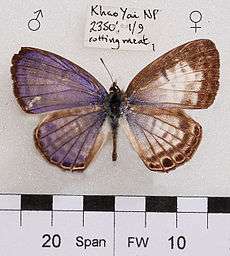Nacaduba angusta
| White lineblue | |
|---|---|
 | |
| Nacaduba angusta kerriana | |
| Scientific classification | |
| Kingdom: | Animalia |
| Phylum: | Arthropoda |
| Class: | Insecta |
| Order: | Lepidoptera |
| Family: | Lycaenidae |
| Tribe: | Polyommatini |
| Genus: | Nacaduba |
| Species: | N. angusta |
| Binomial name | |
| Nacaduba angusta (Druce, 1873) | |
Nacaduba angusta, the white lineblue,[1][2] is a species of lycaenid butterfly found in South Asia.
Description
Male upperside: purple with a frosted silvery-blue sheen very much as in N. macrophthalma. Forewing: a slender black anticiliary line. Hindwing: costal and dorsal margins somewhat broadly dull brown, an anticiliary black line as on the forewing; the subterminal black spots in interspaces 1 and 2 of the underside apparent in most specimens by transparency. Underside: ground colour and markings similar to those of N. macrophthalma but far more slender and more neatly defined. Antennae, head, thorax and abdomen as in N. macrophthalma.
Female upperside forewing: costa broadly, apex and termen still more broadly brown;a narrow edging of pale brown along the dorsal margin; rest of the wing grey, shot with iridescent blue in certain lights. Hindwing: pale brown, much paler than the brown on the forewing; base very obscurely shot with iridescent blue; costal and dorsal margins brownish white; a transverse subterminal series of black spots edged inwardly and outwardly with slender white lines, two minute spots in interspace 1 geminate (paired), that in interspace 2 large, these three crowned inwardly beyond the white edging with an additional dusky spot. Underside: very similar to that of the male, ground colour paler, transverse white strigae broader. Both male and female have the basal area of the forewing within the transverse white strigae lining the inner side of the discocellulars immaculate, as in N. macrophthalma and N. kerriana.
Distribution
Sikhim; Bhutan; Assam; Cachar; Burma; Tenasserim; the Andamans. Described originally from Java.[3]
Presently the butterfly is thought to range in South Asia from Karens to southern Myanmar.[4]
As per Savela, the butterfly ranges, in addition, from northern Thailand, Laos, Vietnam, Singapore, Peninsular Malaysia, Borneo, Sumatra, Java, Nias, Bonggaw, Sulawesi, the southern Philippines, Sanghie, and, possibly Sulu Islands.[1]
Status
Cited references
- 1 2 Markku Savela's website on Lepidoptera Page on Nacaduba genus.
- ↑ Card for angusta in LepIndex. Accessed 5 July 2007.
- ↑ Bingham, C.T. (1907). The Fauna of British India, Including Ceylon and Burma. II (1st ed.). London: Taylor and Francis, Ltd.
- 1 2 Evans, W.H. (1932). The Identification of Indian Butterflies (2nd ed.). Mumbai, India: Bombay Natural History Society. p. 240, ser no H32.1.
See also
References
- Beccaloni, George; Scoble, Malcolm; Kitching, Ian; Simonsen, Thomas; Robinson, Gaden; Pitkin, Brian; Hine, Adrian; Lyal, Chris. "The Global Lepidoptera Names Index (LepIndex)". Natural History Museum, London. Retrieved 2016-10-15.
- Evans, W.H. (1932). The Identification of Indian Butterflies (2nd ed.). Mumbai, India: Bombay Natural History Society.
- Haribal, Meena (1992). The Butterflies of Sikkim Himalaya and Their Natural History. Gangtok, Sikkim, India: Sikkim Nature Conservation Foundation.
- "Markku Savela's website on Lepidoptera".
- Wynter-Blyth, Mark Alexander (1957). Butterflies of the Indian Region. Bombay, India: Bombay Natural History Society. ISBN 978-8170192329.
External links
| Wikimedia Commons has media related to Nacaduba angusta. |
- Asahi Correctly determined photos of N. angusta from the Philippines